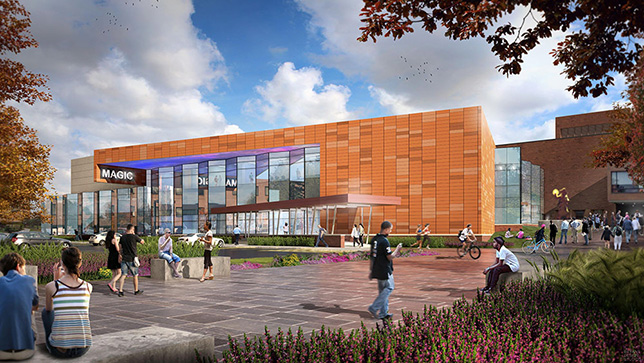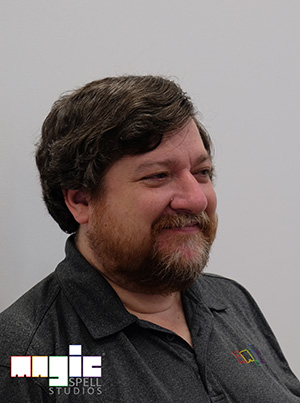Creating a Space for Digital Media Innovation
Rochester Institute of Technology's MAGIC Spell Studios explores the intersection of digital media, film, games and entrepreneurship. The facility breaks down silos between traditional fields such as arts, engineering and computing, and provides a commercial studio for all students, faculty and staff.
Category: Education Futurists
Institution: Rochester Institute of Technology
Project: MAGIC Spell Studios
Project lead: Christopher Egert, chief technology officer, MAGIC Spell Studios and associate professor, School of Interactive Games & Media
Tech lineup: Adobe, Autodesk, Cisco, Dell, Microsoft, Red Hat, Valve

In 2018, MAGIC Spell Studios will expand into a new building, providing cross-disciplinary research and teaching facilities, a "hacker" space, a virtual reality lab and more.
If you have a high-tech center filled with all the latest development tools for interactive digital media, brilliant researchers and students, and expert faculty advisers, what can you achieve? Rochester Institute of Technology hopes to find out with MAGIC Spell Studios, a facility in the institution's Center for Media, Arts, Games, Interaction and Creativity (MAGIC) that is fostering innovation, entrepreneurship and regional economic growth, as well as supporting academic and research goals.
Here's how it works: A unique partnership between RIT, private industry and the state of New York is providing both advanced technology development resources and business expertise to help students, faculty and the regional developer community incubate and commercialize their digital media innovations. As a result, many successful entrepreneurs are poised to support a high-tech development corridor in the region and bring their experience and knowledge back to the university.

Project lead Christopher Egert
Project lead Christopher Egert, MAGIC Spell Studios CTO and an associate professor at RIT's School of Interactive Games & Media, explained, "The studio serves as a way to help students, faculty, industry partners and the community at large move ideas from prototype through commercial production, while at the same time working to support the educational goals, creativity and entrepreneurial potential of each student."
As a part of the MAGIC Center, MAGIC Spell Studios draws on rich technology and professional resources to meet its ambitious goals. Since its inception in 2013, one of the MAGIC Center's key goals has been to create an environment that promotes digital media innovation. With the only rule being that you are not allowed to keep others from using any of the MAGIC Center's resources, developers are encouraged to push boundaries and experiment freely with the amazing array of technology at the Center. To characterize the availability of ample high-end resources and the opportunity to collaborate with other talented developers, center staff and students coined the term "geek heaven." As Egert put it, "Each day, I am working at the intersection of technical challenges in games and digital media and exploring new ways that we work and communicate with each other."
The MAGIC Center's technology resources are plentiful and the most current available. Andrew Phelps, founder and director of the MAGIC Center and MAGIC Spell Studios, said, "We try to get everything that we can — everything cutting-edge — and put it all in the same place to create density and encourage collaboration." Besides the scores of equipment and software resources, MAGIC Center spaces include a sound stage, a movie theater, a VR lab, games labs, animation classrooms, incubation space, collaborative partner spaces and more. Phelps describes the spaces as "overlapping" — deliberately designed, both in physical and technology attributes, for the mingling and converging of developers and projects. Phelps likes to "step back and see what happens": The entire facility is built on the concept of "engineering the happy accident."
The MAGIC Center's success is reflected in its rapid growth, particularly the groundbreaking in 2016 for a new building that, after its opening in 2018, will house MAGIC Spell Studios along with the wealth of the MAGIC Center's expanding technology and development resources. Another sign of success is the increasing support that has come from the university, industry and the State of New York. Major industry partners include Dell, Cisco and the VR First initiative. In addition, the center has long-standing relationships with Adobe, Autodesk, Microsoft, Red Hat, and Valve. Substantial funding has come from the State of New York, an investment intended to boost regional economic development and encourage entrepreneurs to keep their startup ventures in the state.
An important feature of MAGIC Spell Studios is that it models the digital publishing world, helping students and faculty to get their innovations into circulation — something that doesn't come easily to most developers, especially with their first product.
Egert articulated the ongoing plan behind MAGIC: "My vision for MAGIC Spell Studios is that it serves to provide a connection between startup culture, commercial publishing and academic research — to help foster economic growth locally in the Rochester, NY region and New York State, and to serve as an international research center of best practice in the field."
Return to Campus Technology Impact Awards Home